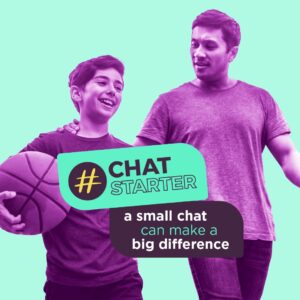Conversations play an important role in recognising when someone is going through a difficult time and connecting them to right type of care.
 Starting a conversation about mental health challenges with someone you care about can sometimes feel challenging. That’s why a partnership between the National Mental Health Commission and Australia’s national mental health organisations who specialise in supporting children, young people, and parents – batyr, Beyond Blue, Butterfly Foundation, headspace, Kids Helpline, Orygen, and ReachOut – have today launched #ChatStarter
Starting a conversation about mental health challenges with someone you care about can sometimes feel challenging. That’s why a partnership between the National Mental Health Commission and Australia’s national mental health organisations who specialise in supporting children, young people, and parents – batyr, Beyond Blue, Butterfly Foundation, headspace, Kids Helpline, Orygen, and ReachOut – have today launched #ChatStarter
#ChatStarter was designed with the support of parents and young people. The program can open opportunities for us to reach people before they reach crisis point and help them access the right type of care. However, talking may not necessarily be the best way to ‘start a conversation’. Sometimes engaging in fun, creative, and productive activities together can transcend barriers to conversation, build trust and help create safe spaces for people to talk about how they’re feeling, and the kind of support they need.
Young Australians and parents are encouraged to create their own content on social media on how they start chats safely with others.
Here are some #ChatStarters to help you start the conversation:
- Walk & Talk – Walking and talking can break down barriers and help people feel less confronted than chatting face-to-face.
- Yarn & Learn – Storytelling can help us understand what people are going through. You might like to yarn with Elders or friends about your experiences and how you’re feeling. You could yarn with members of your household or virtually with others you trust.
- Drive and Debrief – Going for a short drive with someone, or taking them for a drive if they’re not up for it, can provide a short-term escape and provide the opportunity for uninterrupted conversation and a place to calm down or clear heads.
- Bake & Bond – Keeping our hands busy can help someone feel more comfortable in having conversations about challenges. If your child or friend likes baking, encourage them to choose a recipe to make together.
- Relate over Reels – Young people enjoy watching content they relate to – this includes reels and videos on social media. They might share links with you that can help you understand what they’re going through that can help guide conversation. Alternatively, you can sit down and watch some videos together which may help conversation flow.
- Create & Connect – This is just for fun – what we draw, write, paint, cook, dance, capture and play can help give insights into someone’s experiences. Try photography – why not go bush? Go outside to the backyard or the park nearby if possible and spend time taking photos. You don’t need a special camera to capture beautiful colours, textures and reflections.
- Dance & Download – Dancing is a great way to express yourself. You, your family, Elders, friends or anyone in your household might like to pick some songs and dance. If you’re in different households, a video call to dance and move is a great alternative to face to face when restrictions are tight.
- Stretch & reflect – Stretching and self-reflecting can spark insight, which can alter the way we see ourselves and those around us.
- Celebrate & share– Celebrate the small things together, a home-cooked meal, a friendly message from a friend, a smile or even a wave from the neighbour, or anything that makes you feel good.
- DIY & decompress – Remember that cool cupboard you wanted to build? Ask your parents or siblings to give you a hand at starting a DIY project to focus your mind on.
For more information visit headtohealth.gov.au/covid-19-support/chatstarter
Disclaimer: This article was provided by National Mental Health Commission. While every effort has been made to ensure the information is accurate, North Western Melbourne Primary Health Network does not warrant or represent the accuracy, currency and completeness of any information or material included within.




